“`xml
Are you considering stepping into the world of data science? Whether you’re just getting started or want to boost your existing skills, finding the right course might just be the springboard you need.
With countless options out there, figuring out which course is truly worth your time and money can feel overwhelming.
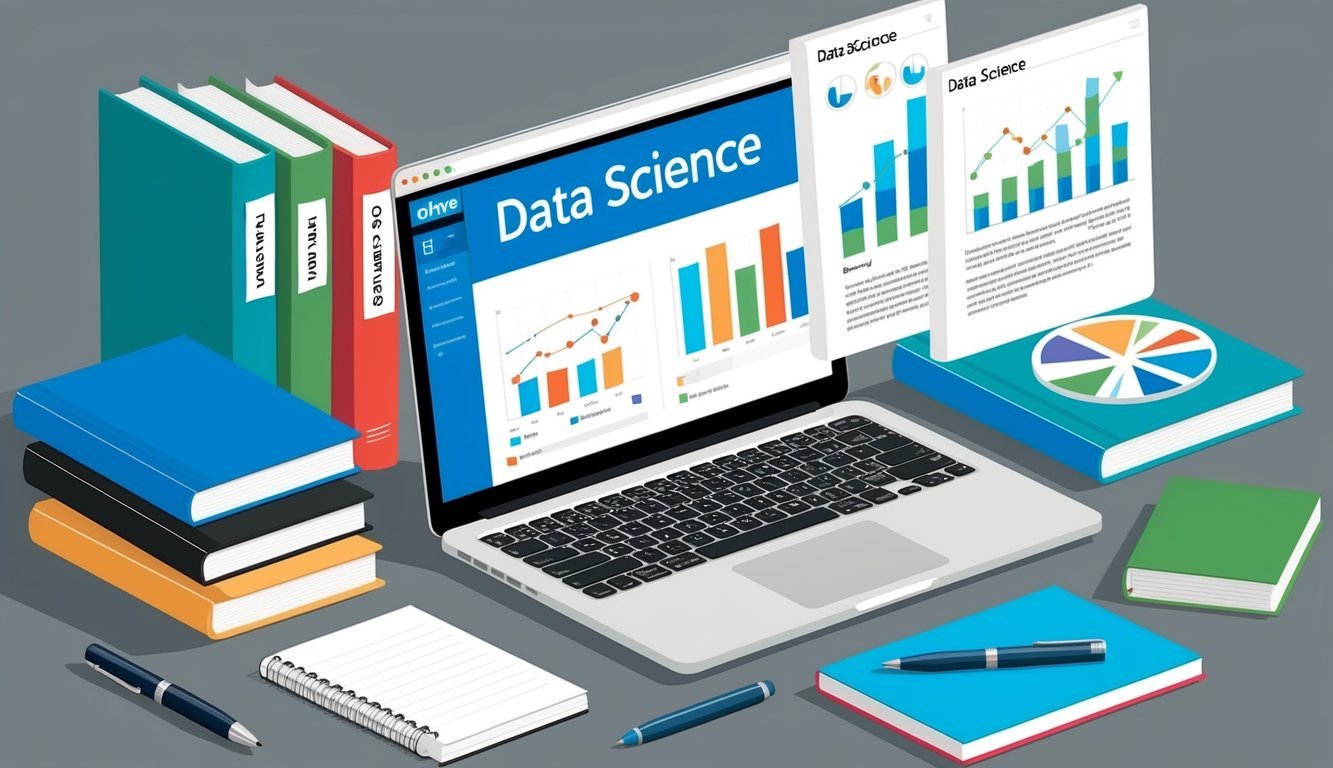
This guide is designed to help you uncover the best online courses specially tailored for beginners in data science. With these courses, you’ll lay a solid foundation, get familiar with various tools and techniques, and set yourself up for thriving in the data-driven world.
1) Data Science A-Z: Real-Life Data Science Exercises In Python
If you’re dipping your toes into data science and want a course bursting with practical examples, you should definitely check out Data Science A-Z: Real-Life Data Science Exercises Included.
This course is all about hands-on learning, giving you access to real-life datasets that illustrate how concepts work in the real world.
You’ll get to play with useful tools like SQL, Tableau, and Gretl, which any aspiring data scientist should know.
The setup is a breeze, allowing you to focus on learning without getting tangled up in technical issues.
A standout feature? The support you get.
The teaching assistants are praised for being super helpful, and the Q&A discussions are lively.
This means you’re not just absorbing info from course creators but also learning from a vibrant community.
No matter if you’re a total newbie or just looking to sharpen your data science skills, this course gives you the grounding you need.
Plus, the real-life exercises make learning not just effective but fun!
2) Python for Data Science and Machine Learning Bootcamp
Looking for a super popular course? Consider the Python for Data Science and Machine Learning Bootcamp – it’s designed to equip you with essential skills that can propel your data science journey.
This course covers everything from basic Python to advanced machine learning concepts.
You’ll dive into data visualization using handy libraries like Matplotlib and become a pro in data analysis with Numpy and Pandas.
It’s all about learning those core skills in an efficient way.
Get excited because you’ll also tackle a large data analysis project involving over 60 million data points! That’s an epic way to gain real-world experience!
If you want more details about this course, check out the Python for Data Science and Machine Learning Bootcamp on Udemy.
It’s a fantastic resource for anyone eager to dive into data science with Python.
3) Machine Learning A-Z: Hands-On Python & R In Data Science
If you’re about to take a plunge into data science, the Machine Learning A-Z course could be the perfect fit.
Made by experienced data scientists, it breaks down complex topics into bite-sized, manageable pieces.
You’ll not only learn the theory but also roll up your sleeves to work on practical exercises.
This course guides you in constructing and assessing predictive models, a critical skill in the field.
If you’re comfortable with Python and R, you’re going to enjoy this.
With a blend of Python and R, you’ll gain a dual advantage by learning two powerful programming languages in demand in data science.
Whether you’re nervous about coding in Python or want to get a grip on R, this course caters to various levels of expertise.
It’s also an excellent choice if you’ve got a statistical background and want to kickstart your journey in machine learning.
Find more about the course on Udemy by visiting the Machine Learning A-Z: Hands-On Python & R in Data Science.
You’ll build meaningful expertise at your own pace.
4) Data Science and Machine Learning Bootcamp with R
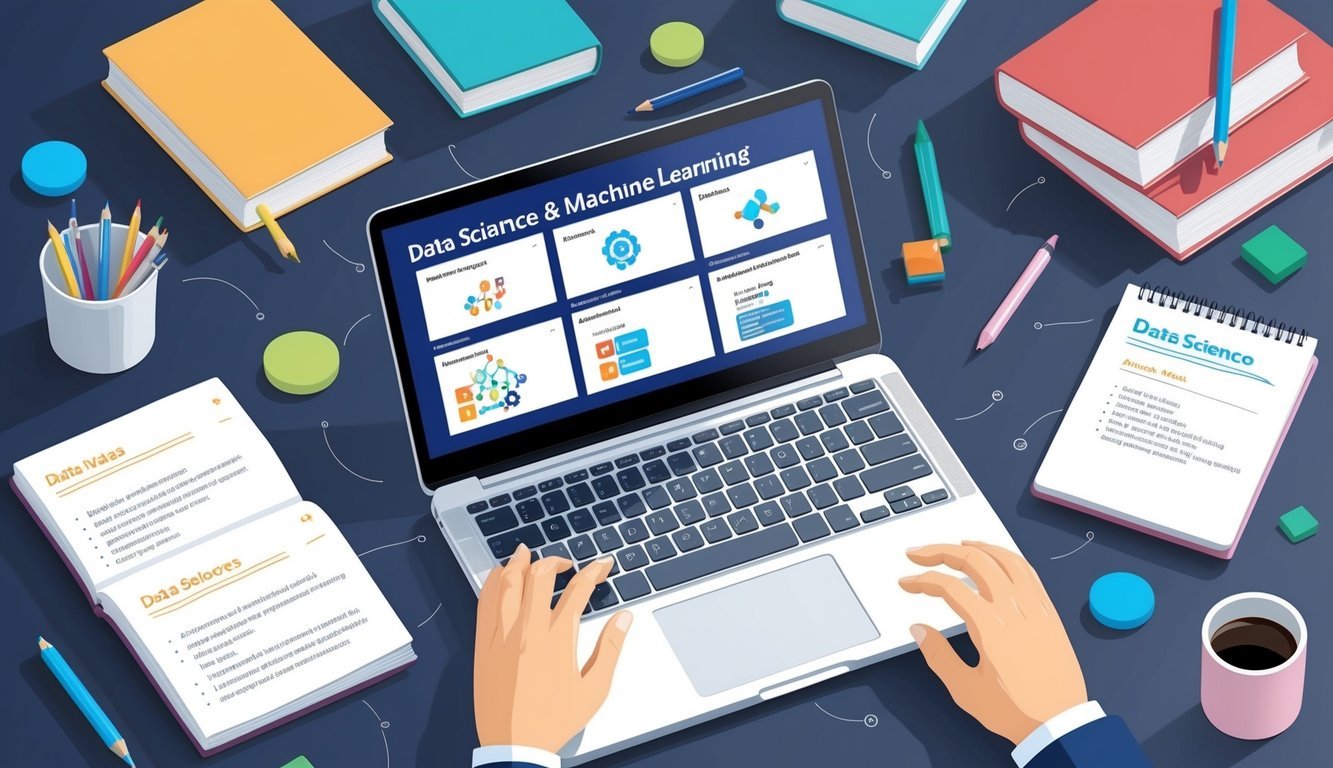
If you’re diving into data science with R, this bootcamp is a solid choice.
You’ll learn the nitty-gritty of programming with R, which is fantastic for data analysis—even if you don’t have prior experience.
The course covers a variety of skills, focusing on creating eye-catching data visualizations.
Visualization is key to telling a story with your data, and you’ll learn how to make those insights shine.
Machine learning is a central piece of this bootcamp too.
Understanding machine learning concepts will equip you to apply models and algorithms to real-world scenarios.
Soon you’ll be confidently using your new skills to tackle diverse data science projects.
With hands-on projects to apply what you learn, you’ll solidify your knowledge and understand how data science and machine learning can make a difference in business strategies.
Ready to jump in? Check out the Data Science and Machine Learning Bootcamp with R and kickstart your data science adventure.
5) Deep Learning Specialization by Andrew Ng
If you’re new to data science, Andrew Ng’s Deep Learning Specialization could be a game-changer.
Offered on Coursera, this course introduces you to the fundamentals of neural networks and deep learning.
It’s designed to help demystify the potential and limitations of deep learning technology.
This specialization consists of five courses, each aimed at progressively building your knowledge.
You’ll dive into building, training, and applying neural networks, with hands-on experience covering architectures like Convolutional and Recurrent Neural Networks.
What’s compelling is how Andrew Ng makes complex concepts feel approachable.
Even if deep learning sounds daunting, his teaching style makes it digestible.
By the end of this training, you should have a solid understanding of key trends in technology and be able to construct effective neural networks.
Interested? Find more details on Coursera’s Deep Learning Specialization.
This course is an excellent way to lay the foundation for a future in AI and machine learning.
Plus, you’ll gather hands-on experience with deep learning frameworks that allow you to build and fine-tune models confidently.
6) Statistics for Data Science and Business Analysis
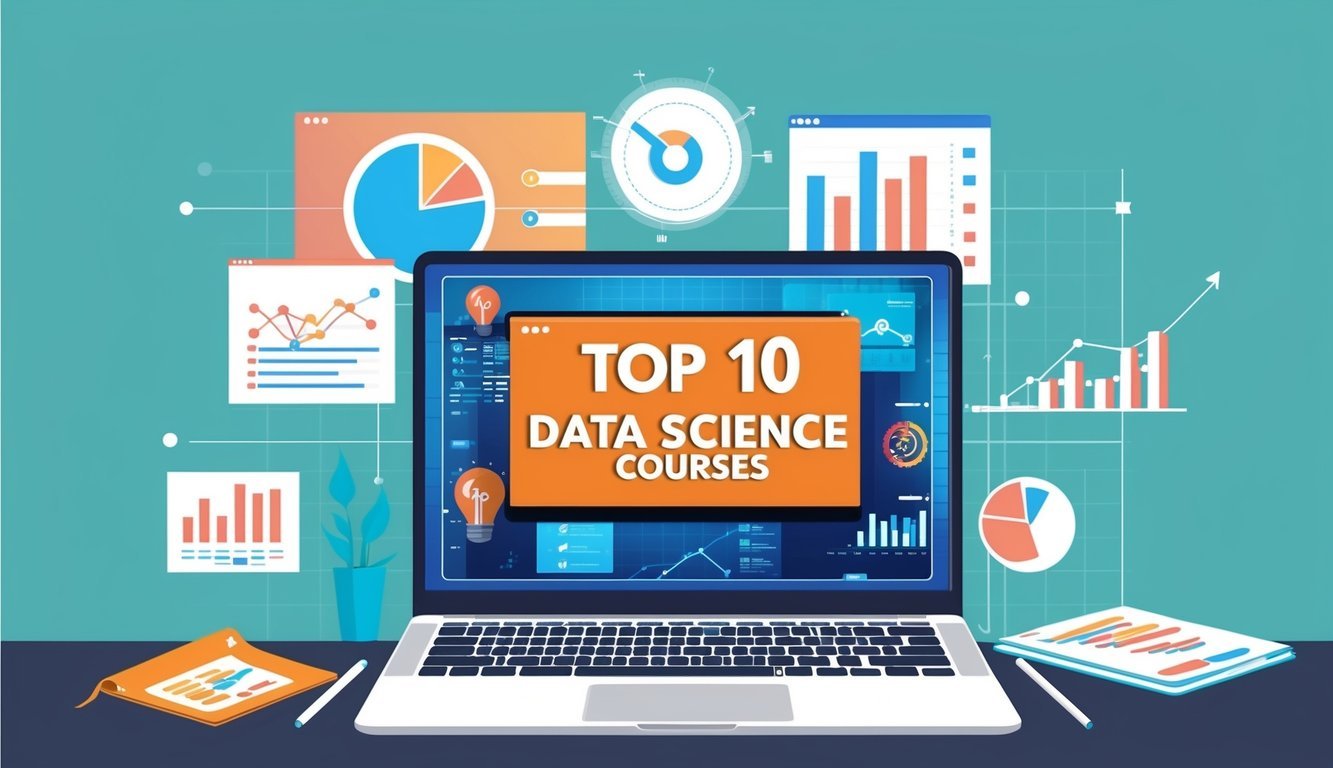
If you’re venturing into data science, mastering statistics is essential.
You’ll find loads of courses teaching you how to analyze data effectively, and Statistics for Data Science and Business Analysis covers the key essentials like central tendency and hypothesis testing.
You’ll dive into regression analysis—understanding the relationships between variables.
Picking up these skills lets you predict outcomes and trends, which is crucial in data science.
Plus, you’ll learn about confidence intervals and correlation, which will help you summarize and draw meaningful insights from your data.
This course uses real-world examples, helping tie concepts into practical situations.
You’ll calculate correlations and work through various distributions to enhance your analytical toolkit.
Perfect for beginners, this course lays a solid foundation in the statistical concepts necessary for your data science journey, guiding you through everything with clear examples and exercises.
If you’re aiming for roles in data analysis or business intelligence, this course is an excellent stepping stone.
7) Introduction to Data Science by IBM

The Introduction to Data Science course by IBM is a fantastic launchpad for your data science journey.
Available on platforms like Coursera and edX, this course provides the flexibility you need in your learning.
In this course, you’ll explore essential data science concepts and practical skills.
You’ll learn about what data scientists actually do and the tools and techniques they use daily.
It’s designed to help you grasp the role of a data scientist and set a foundation for your forward journey.
You’ll even get hands-on experience with popular programming languages like Python and R, which are crucial for data analysis tasks.
By the end, you’ll feel more confident in your ability to tackle data challenges.
Learning with IBM can be a great opportunity, as their knowledge is recognized and valued in the industry.
If you’re new to data science, this could be the stepladder you’ve been looking for.
8) Data Science and Analytics Career Paths and Certifications: First Steps
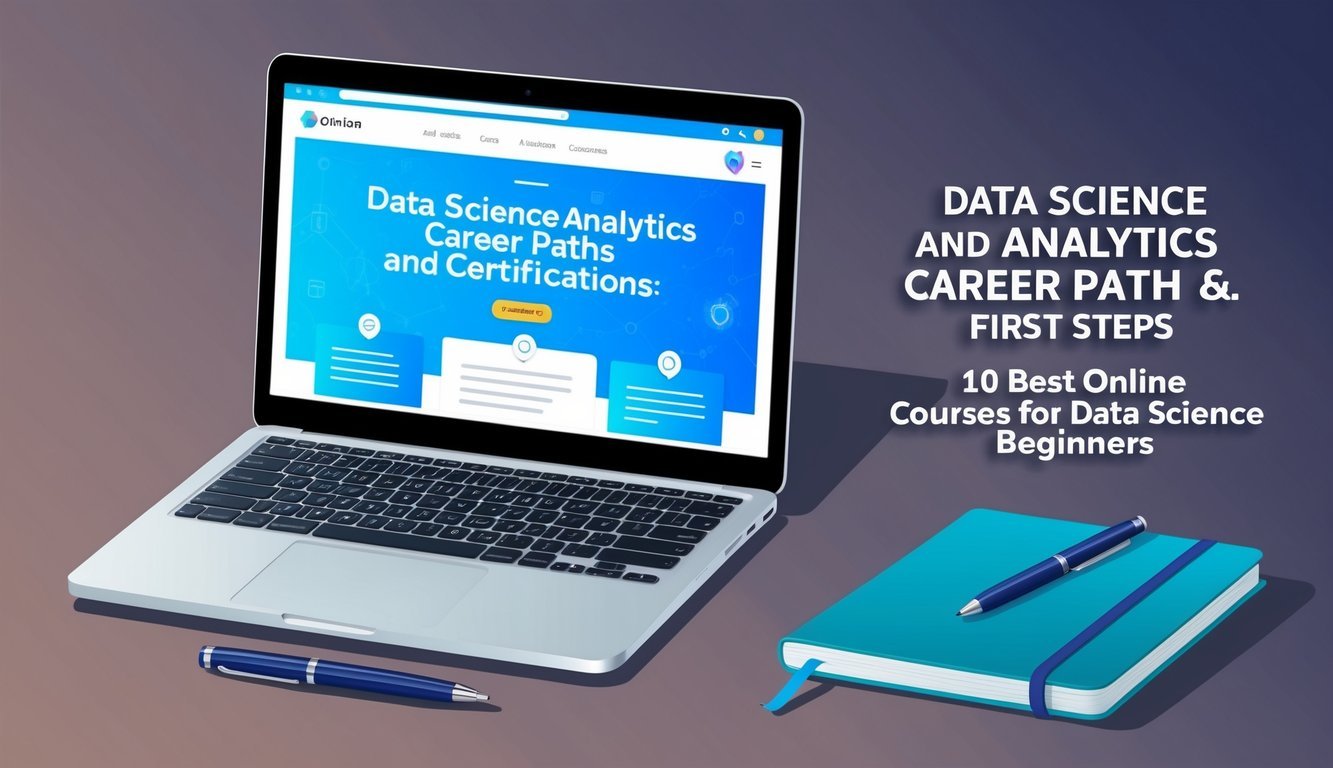
If you’re just starting out in data science, this course offers invaluable guidance on possible career paths.
With all the opportunities in data science, big data, and analytics, this course is a great way to understand where your skills can take you.
You’ll get the lowdown on various roles, from data analyst to data engineer, along with the skills required for each.
The course also touches on essential ethics and professional development to keep you grounded as you make your way up the career ladder.
Industry-recognized certifications can really set you apart in this field.
This course helps you discover the top certifications that align with your career aspirations, along with insights from professionals that can illuminate the path ahead.
Want to dive deeper? Check out the Data Science and Analytics Career Paths and Certifications: First Steps page.
9) R Programming A-Z: R For Data Science With Real Exercises!
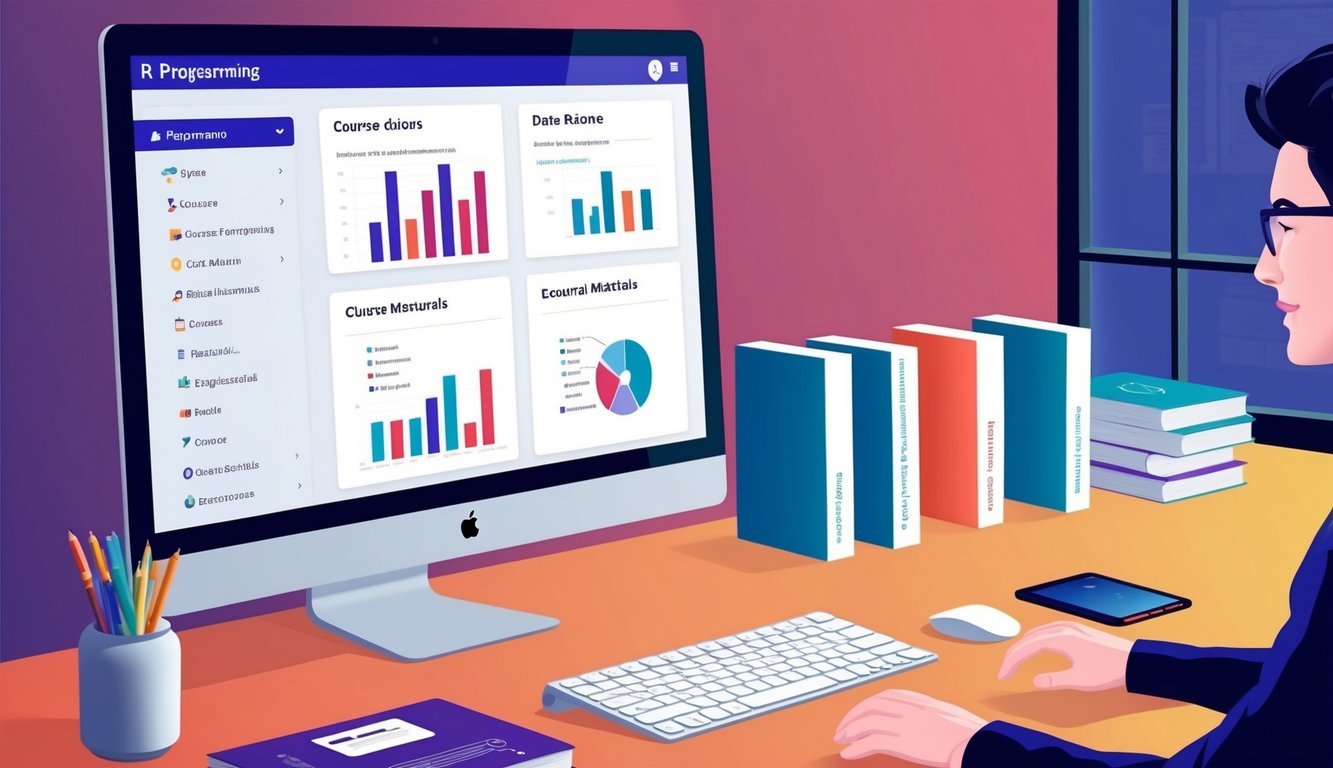
If you’re kicking off your journey in data science, the R Programming A-Z course may just be what you need.
This course takes you through R programming with a hands-on approach, designed to help beginners wrap their heads around complex concepts with ease.
R has a bit of a reputation for being tricky, but this course is crafted to help you tackle that challenge.
You’ll learn R by actually doing, which means you can expect plenty of practical exercises that reinforce your learning.
Expect to cover the essentials like data analytics, statistical analysis, and more.
You’ll get familiar with packages, functions, and even visualizations with GGPlot2.
It’s perfect if you enjoy learning step by step.
The structure of this course builds on your existing knowledge, slowly introducing new concepts with each tutorial.
Want more details? Check out R Programming A-Z on Udemy.
10) Introduction to Machine Learning by Andrew Ng
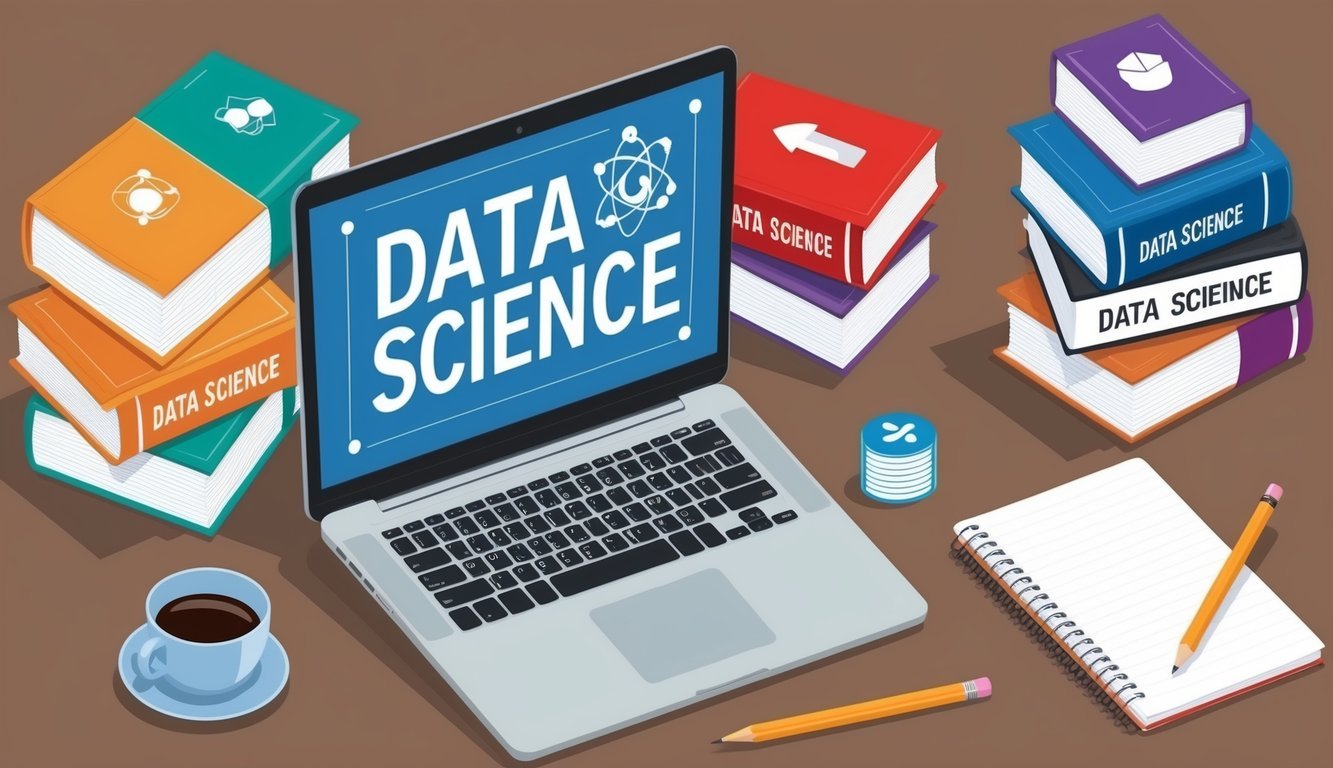
If you’re just starting out in data science, Andrew Ng’s machine learning course is a solid pick.
Available on Coursera, it lays a strong foundation in machine learning concepts.
Andrew Ng, a well-respected figure in the field, ensures quality instruction.
This course is crafted to be beginner-friendly, making it a breeze even for those new to data science.
It covers key topics like supervised and unsupervised learning, alongside neural networks.
You’ll get hands-on experience with real-world applications, which is crucial.
It’s a fun mix of video lectures, quizzes, and assignments that help reinforce what you learn.
Designed to keep you engaged, the course allows you to learn at a pace that suits your schedule.
If you prefer video learning, go ahead and check out the Stanford CS229: Machine Learning Full Course on YouTube.
It’s a comprehensive introduction to machine learning and statistical pattern recognition.
Understanding Data Science

In this section, we’ll dive into what data science really is and the key skills you’ll need as a beginner in this fascinating field.
What Is Data Science?
Data science is a blend of tools, algorithms, and machine learning principles that aims to uncover patterns from raw data.
Think of it as a toolkit where you pull together programming, statistical analysis, and domain expertise.
You’re not just crunching numbers; you’re transforming raw data into insights that can influence business strategies or scientific breakthroughs.
At its heart, data science involves gathering data, cleaning it up, and hunting for interesting trends.
You’ll likely work with huge datasets, using a mix of creativity and tech skills to tackle real-world challenges.
Essential Skills for Beginners
Starting out in data science means you’ll need a blend of both technical and soft skills.
Programming skills are absolutely essential; languages like Python and R are keys that will unlock your analytical potential.
Statistics is another must-have area.
Knowing your way around probability, distributions, and data analysis techniques is foundational for making sense of data.
Don’t forget about soft skills like problem-solving and communication.
You should be comfortable explaining your findings to folks who might not be tech-savvy, making complex insights a breeze to grasp.
Getting comfortable with data visualization tools like Tableau can also boost your ability to present your data stunningly.
This blend of skills will set a strong base for your data science journey.
Tips for Choosing Online Courses
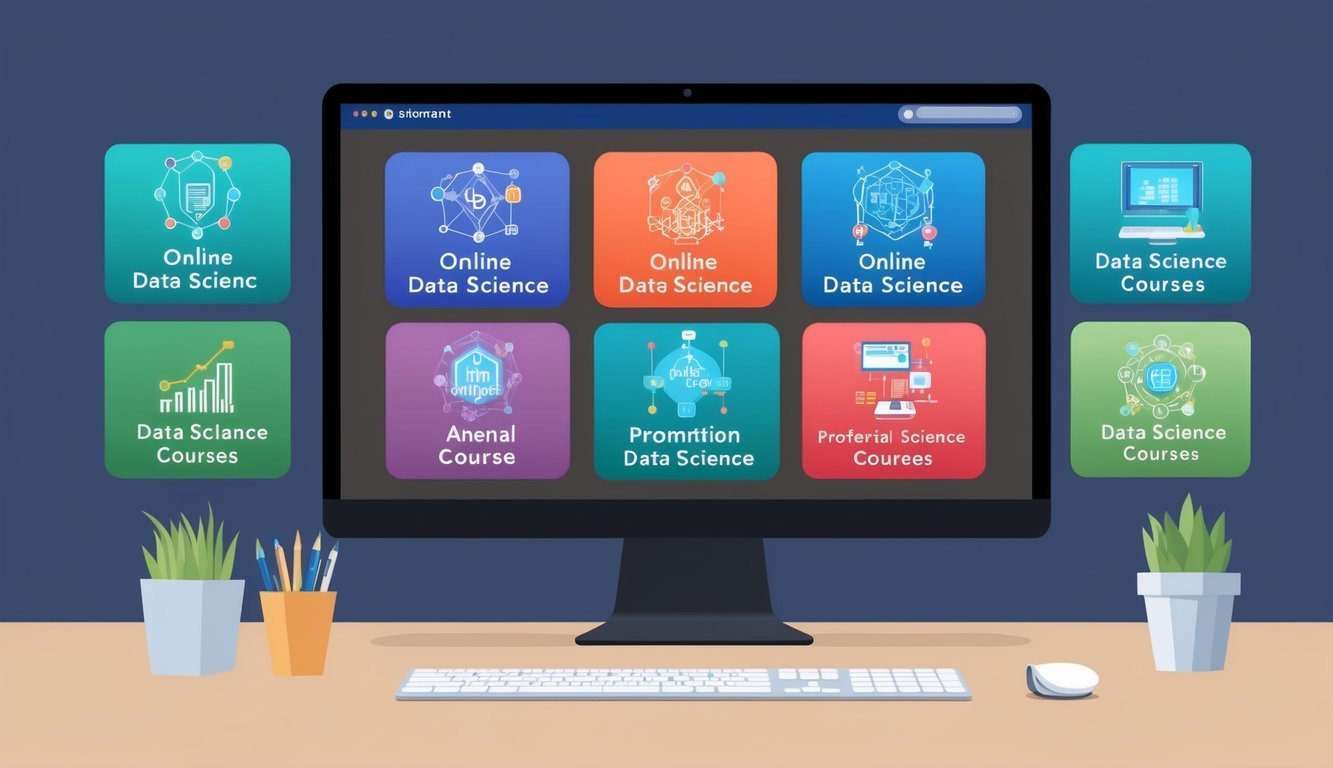
Here’s what you should know to nail that decision.
Accreditation and Course Reputation
First up, check if the course is offered by a reputable institution or platform.
You want your time and effort to matter, so go for recognized courses.
These often come with accredited programs, which can add some sparkle to your resume.
Look for reviews and testimonials from past students.
Their feedback can be a goldmine for gauging the quality and effectiveness of the course.
It’s also smart to check whether the instructors are seasoned professionals with a strong reputation in the field.
This can give you a good sense of the course quality.
Pro tip: Courses from respected universities or platforms like edX or Coursera often boast high credibility, so verify the claims before you take the plunge.
Balancing Flexibility and Structure
Consider your own schedule and learning style when picking a course.
If you’re juggling multiple commitments, look for one that offers flexibility or a self-paced format.
This allows you to learn without the stress of tight deadlines.
However, some folks thrive on structure.
If that’s you, hunt for courses with set schedules and regular deadlines to keep you on track and ensure steady progress.
Also, check if the course includes a mix of live sessions, recorded content, and interactive elements.
This variety can enhance your learning experience and keep you engaged.
Being a part of communities or forums connected to the course can provide valuable insights and networking opportunities—you never know who you’ll meet!
Exploring Career Opportunities
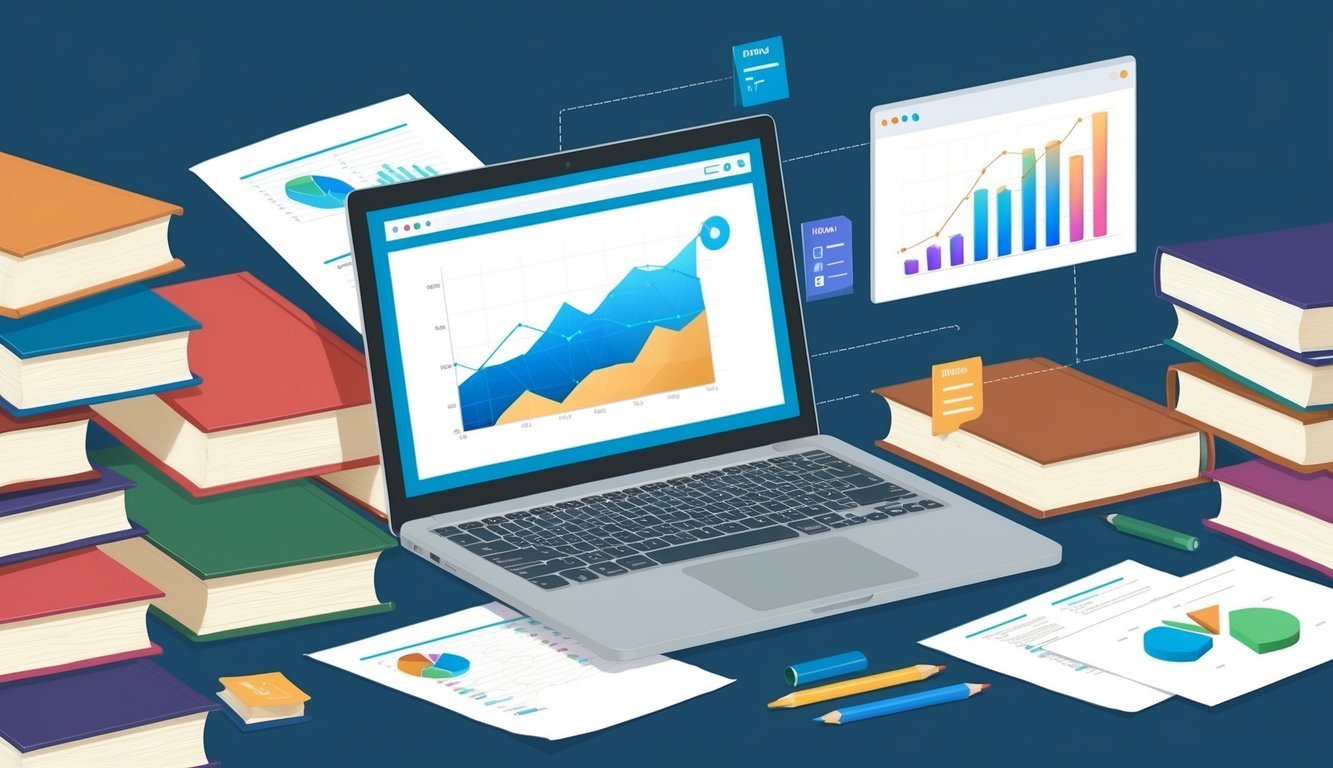
Jumping into data science opens a box of possibilities.
You’ll find all sorts of entry-level positions that can kickstart your career, and building a solid portfolio is key to showcasing your skills.
Entry-Level Positions in Data Science
Starting out in data science often leads you to roles like data analyst or junior data scientist.
These positions typically focus on analyzing datasets, generating reports, and interpreting trends.
You’ll likely work closely with seasoned team members who will help you sharpen your skills and grow professionally.
Key skills for these roles include being comfortable with programming languages like Python or R, along with an understanding of SQL for database management.
Employers often seek candidates who are skilled in statistical analysis and data visualization.
Consider looking into industries like finance, healthcare, or marketing, where data-driven decision-making is increasingly crucial.
Many companies are eager to train and develop passionate beginners, so showing your enthusiasm for data science can go a long way.
Building a Portfolio
A portfolio is a vital asset as you launch your data science career.
It’s your chance to display projects, coding skills, and analytical thinking.
Start by including academic projects or coursework where you’ve applied data science techniques.
As you gain experience, add personal projects that reflect your interests, like analyzing public datasets or crafting engaging visualizations.
To make your portfolio stand out, consider showcasing your work on platforms like GitHub.
Use concise documentation to explain your code and methods clearly.
Highlight projects where you’ve tackled real-world problems or demonstrated creative solutions.
A well-rounded portfolio not only proves your capabilities but also helps potential employers see how you can turn complex ideas into understandable insights.
“`

